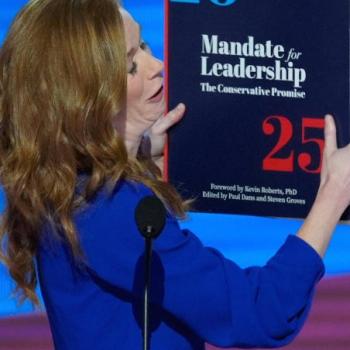Tribulation Force, pp. 33-38
The awfulness of the remainder of this chapter seems — by LaHaye & Jenkins' standards — fairly mundane. The authors of the World's Worst Books usually set themselves apart as trailblazers, seeking out and exploring brave new forms of Bad Writing. But here they've wound up in the well-worn territory of the first blush of young love — ground that has been well-covered by Bad Writers for centuries. On this particular topic, L&J don't necessarily distinguish themselves as far worse than all of their competition.
 My response to these scenes of Buck and Chloe's awkward, halting, immature circling is also mitigated by two responses not provoked by most scenes in these books: relief and pity.
My response to these scenes of Buck and Chloe's awkward, halting, immature circling is also mitigated by two responses not provoked by most scenes in these books: relief and pity.
The relief arises from the extreme prudery of L&J's portrait of fundamentalist courtship. We'll look at some of the more peculiar aspects of this, which provide a bit of insight into the authors' premillennial dispensationalist subculture. But before exploring the quirks of this spiritualized, Neo-Victorian uptightness, let's first express our gratitude, the source of the relief I mentioned: This prudery also means that we will be spared the unthinkable horror of anything approaching an explicit love scene.
So that's good.
As for the pity, most of this series presents its heroes behaving monstrously, celebrating an inhumanly self-absorbed lack of empathy as a kind of virtue. Most of what we read here, then, leads me to view the authors with disdain. My emotional stance toward the authors throughout most of these books, therefore, is a desire to see them punished.
Here though, in this painfully awkward "romantic" subplot, we catch a glimpse of something autobiographical. The painfully confounding, sex-obsessed notion of purity portrayed here is likely all they know. It's what they have lived themselves. It's a reminder that the inhumanity they display and champion arises, at least in part, from their own miserable attempts to live inhumanly. And that merits a measure of pity.
I'm not sure that this category of "newest believers" means a whole lot in a room in which everyone has converted within the same two-week timeframe, but that's not really the point of that sentence. The point of that sentence is that pastors — people like Bruce Barnes or Tim LaHaye — carry this enormous weight of leadership, a burden we mere laypeople couldn't possibly hope to understand. (Matthew 24, the "mini-apocalypse" of Jesus, is an oft-quoted passage for PMDs like LaHaye. Matthew 23 — Jesus diatribe against spiritual leaders who get overly full of themselves — doesn't get nearly as much attention.)
"I know what you mean."
Buck is referring to the dose of perspective he just swallowed due to what Bruce just told them about the onset of the Great Tribulation. He's not referring to the fact that the inside of his new car smells like spiky-haired Alice's perfume. Nor to the fact that used car lots would be flooded with kid-friendly minivans and vehicles of every make with fish symbols on them.
"You want to join us for dinner?" Chloe offers. To which Buck, displaying the uncanny perception of the Greatest Investigative Reporter of All Time, responds, "I'm not really hungry."
This is why I worry that seven years and 13 books may not be world enough and time for these two to get together.
"Do you have furniture yet?" she asked. "You could stay with us until you get some. We've got plenty of room."
He thought about the irony of that. "Thanks," he said. "It's furnished."
The "irony" of "we've got plenty of room" refers to the disappearance of half of the Steele family two weeks ago. Jenkins has given just enough thought to the post-Event scenario to remember that the Steele home is half-empty, but he still hasn't given any thought to what the disappearance of 2 billion other people might mean in terms of half-empty apartment buildings, half-empty neighborhoods or wholly empty elementary schools.
Buck described the condo, halfway between church and the Weekly.
"That's not far."
"No," Buck said. "I'll have everybody over once I get settled."
Rayford had opened his car door, and Chloe waited at the passenger door. The three of them stood silent and awkward in the dim light from the streetlamps.
Part of this I recognize — that sense of awkward silence "in the dim light from the streetlamps" as what is to be said and done before parting is being weighed and decided. But this familiar scene is rendered weirdly alien by the beginning of that sentence: "The three of them stood …"
This continues and expands into a theme of sorts. The courtship of Buck and Chloe is a story involving three people. Rayford is an integral part of this budding romance, and none of them seems to regard that as strange or disturbing, inappropriate or intrusive.
The role of the father in this strain of evangelical "courtship" is more than a little bit creepy. One gets the sense here, as with those extremely creepy Purity Balls, that the authors view Buck as petitioning to replace Rayford as the male in charge of Chloe — that Rayford, as her father, must play the part of surrogate for her future husband until that role is ceded over on her wedding day. This suggests an unsettling equivalence between father and husband — as though daughters are supposed to be dating Daddy until they are handed over to the only other man they'll ever love. This suggests a parallelism between two things that really aren't, and really ought not to be, parallel, and … well, just ewww.
Chloe gave a little wave, and Buck turned away. He felt like an idiot. What was he going to do about her? He knew she was waiting, hoping for some sign that he was still interested. And he was. He was just having trouble showing it. He didn't know if it was because her father was there or because too much was happening in their lives right now.
A bit of both of those things, I'd guess. Plus a heavy dose of two supposed adults who are capable of giving and receiving a "note" confessing romantic attraction without that note in any way altering their spiritualized timidity.
vial, considering all Bruce h
ad just talked about?
Buck had already fallen in love with God. That had to be his passion until Christ returned again. Would it be right, let alone prudent, to focus his attention on Chloe Steele at the same time?
This recalls the ancient idea of a vow to celibacy that enables one to focus on devotion to God, but I don't think that's really what's going on here. Particularly since Buck doesn't seem called to the gift of celibacy:
Fat chance.
What I think we see a trace of here is the idea of an either/or, of love as a finite resource and a zero-sum game. One can either love God or "get interested" in someone else. And that either/or doesn't only seem to apply to romantic love here in Left Behind. It seems to extend also to love of neighbor, as though one must choose between the greatest commandment and the second, which is like unto it. Time after time, this is how we see our heroes behave in these books — withholding or refusing to love their neighbors lest it distract them from loving their God.
LaHaye and Jenkins take this God or neighbor idea to monstrous extremes in these books, but they don't have exclusive claim to this particular heresy. Go into any of the "Christian book stores" that sell the Left Behind series and you'll also find a host of books on the subject of loving God. Those books will discuss praise, worship, personal purity, prayer, Bible study and all of the other legitimate but secondary or tertiary ways of expressing one's love for God. But almost none of those books will discuss what the Gospels, the prophets and the epistles all say is the primary, necessary expression of love for God: love for neighbor.
Jenkins shoots for romantic-cute here by cutting between scenes of Buck's anguished pining and scenes from Rayford's point of view in which Chloe expresses the very same emotions, doubts and fears. This is an old trick in romantic comedy — as old, at least, as Rosalind and Orlando — but it only works if readers have reason to like both characters, and if there is some valid reason, other than immaturity or stupidity, for them not to express these thoughts to one another.
Roger Ebert has noted that writing two characters who are meant for each other is the easy part of romantic comedy. The hard part is devising a way to keep them apart for an hour and a half without making them seem like idiots. Jenkins here gets both parts wrong.
I give him some credit, though, for alluding to one of the sources for the model of Christian romance he's aiming for here: "Let Buck get settled in and he'll come calling," Rayford tells Chloe.
Laura Ingalls Wilder — and probably also Grace Livingston Hill — outlined the formula for the kind of chaste, pious, formal, father-centric courtship Jenkins is copying here. Their novels were written and set in a pre-telephone age, which is probably why Buck, with Chloe, avoids his favorite form of communication, opting for a more epistolary approach.
But did someone mention telephones?
He's got three messages. The first is from Mrs. Col. Potter, letting him know she'd shipped his belongings out to Chicago:
The third was from his old executive editor, Steve Plank, now Nicolae Carpathia's spokesman. "Buck, call me as soon as you can. Carpathia wants to talk to you."
Buck sniffed and chuckled and erased his messages. …
He chuckled? Really? Because if I hadn't even gotten started yet on the biggest assignment of my lifetime and my boss told me I had to get it to him in a week, "and we need to talk," I'd be sweating bricks. Chuckling also doesn't quite seem like an appropriate response to learning that you've been summoned by the Antichrist. Maybe it was a nervous chuckle, because Buck seems to understand that the call from Steve wasn't good news:
What would Nicolae do? Buck "could only wonder," we're told. But wondering is hardly the only thing he can do. He could fake his own death, change his name, dye his hair and take off to Paraguay, for starters. That might be a more reasonable response than chuckling and wondering.
Or at the very least he could decide that, as a person on the Antichrist's radar-screen, it would be wrong for him to put Chloe's life in danger, too, by pursuing a relationship with her. That would be a good rationale for why those two need to stay apart, providing a nice shot of romantic tragic nobility. But this doesn't occur to him. It doesn't really even occur to him to take any steps out of concern for his own safety. Or, for that matter, to get cracking on that big article.
We cut back to Rayford who is again watching CNN — a reminder both of all the stories Buck hasn't been covering at all, and of the fact that Jenkins apparently hasn't watched enough CNN to get a sense of what it actually sounds like.
So the pundits all seem to agree that the relocation of the U.N. to ancient ruins in Mesopotamia is a good move. Sure, it's arbitrary, unnecessary, disruptive and expensive, but it will result in a massive arsenal being stockpiled in the Middle East, and what could possibly go wrong with that?
That last bit about the architecture of the U.N. building is meant to sound sophisticated and knowing. That's a bit out of place here, in a passage in which the authors loudly proclaim their own unsophisticated ignorance. The only thing less realistic and more off-the-wall insane than Carpathia's crazy-quilt agenda is the idea that everyone would just matter-of-factly accept such an agenda as though it were useful or helpful or as though it made any kind of sense at all in any way.
To whom, I
wonder, is the idea of a single world religion supposed to sound attractive? I can't begin to imagine what such a religion would even look like or why anyone would find it compelling. Yet L&J assume that everyone would find it compelling — that such a thing would somehow fulfill the unspoken desire of every religious believer or atheist outside of Real, True Christianity, and that every Jew, Muslim, Sikh, Hindu, Episcopalian, Pagan and atheist would gladly abandon whatever belief system they held in exchange for this amorphous and undefined spiritual esperanto. To really believe that, as L&J apparently do, one can't have ever actually met anyone who was Jewish, Muslim, Sikh, Hindu, Episcopalian, Pagan or atheist. How is that possible?
Enter Chloe, "Her freshly washed hair was wrapped in a towel."
"Not funny," she said.
"It wasn't meant to be. Would that be so strange, someone asking you out?"
"The only person I want to ask me out has apparently changed his mind about me."
"Nonsense," Rayford said. "I can't imagine all that must be on Buck's mind."
"I thought I was on his mind, Dad. Now I sit here like a schoolgirl, wondering and hoping. It's all so stupid. Why should I care? …"
Yes, that's exactly what I was thinking too. It's all so stupid. Why should I care?
This father-daughter discussion continues for another page, leading to:
"Our invitation? I was in on that?"
"Well, it wouldn't have been appropriate for me to ask him out by myself."
And suddenly here we are back in the 19th century with the Ingalls and Grace Livingston Hill.
Chloe, we are being asked to believe, does not think it would be appropriate for her to share an unchaperoned meal with Buck. This outlandish sense of propriety seems not to be intended as a result of her recent conversion, but rather something she already believed as a non-RTC undergrad at Stanford. Part of why Chloe and Buck are meant for each other, it seems, is that they both — even in the years before their conversion — have maintained perfect chastity.
It is, of course, possible that two attractive, mentally competent, red-blooded American young people might compile a cumulative 50 years of unblemished virginity. But this would be a remarkable thing, and the authors are presenting it as something utterly un-remarkable. That strains realism. It's also not easy to reconcile with the authors' own portrait of Last Days America as a hedonistic Sodom and Gomorrah where, as in the days of Noah, the godless eat, drink and make merry.
The sense one gets is that Buck and Chloe had to be presented as unspoiled. Had either of them ever been kissed it would have rendered them, in the authors' view, as unworthy of the other's affection — unworthy perhaps even of the second chance at salvation they have been given.
We've previously discussed L&J's "say the magic words" understanding of salvation and how this suggests something like Gnosticism. Buck and Chloe aren't presented as repentant sinners saved by grace as much as they as initiates into the secrets and mysteries of Those Who Know The Code. Thus instead of the more conventional Christian story of sin and redemption, we get something more like a Gnostic story, portraying pure souls worthy of attaining enlightenment.
Put another way, Buck and Chloe's perfect chastity conveys the sense that forgiveness of sins is available, provided you don't really have that many sins that need forgiving. "It is not the healthy who need a doctor, but the sick," Jesus said. "I have not come to call the righteous, but sinners to repentance." In L&J's world, however, Jesus isn't so much a doctor as he is an American health insurance company, skimming for the most lucrative healthy patients and rejecting anyone with a pre-existing condition.
This has pastoral consequences as well. Some 60 million American evangelicals have read these books. The sexual activity of American evangelicals does not differ in any statistically significant way from the sexual activity of their non-evangelical American counterparts, so there must be tens of millions of those readers who encountered this romantic subplot and found there the message that they were guilty of unpardonable sins, forever marked and tainted, spoiled and unworthy. That's a horrible, horrible message. It's heretical, too, but mainly it's just cruel.
All of this Bad Theology also makes for Bad Romance. It presents Buck and Chloe's affection for one another as something conditional and contingent. Conditions and contingencies aren't usually what we're looking for in a love story.
















